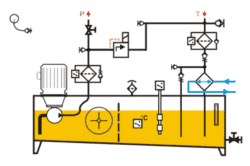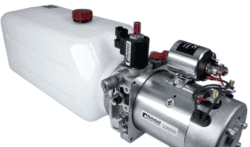Since the invention and refinement of hydraulic-powered systems, large sections of industry and commerce have come to rely on hydraulic power. Any time that a heavy load needs lifting, you can be sure it is not far away.
The Basics
The main components of a hydraulic power unit are a pump, a motor, a reservoir and valves.
The pump is responsible for supplying pressurised fluid to the motor which then converts it into mechanical energy. It can either be a single pump or multiple pumps each with its own accumulator valve.
The reservoir stores the pressurised fluid which is then used to operate the other components of the hydraulic power unit.
Valves control the flow of fluid in order to regulate pressure and ensure that it is being used efficiently.
The use of hydraulic power units (HPUs) is also becoming increasingly popular in a variety of applications. HPUs are self-contained systems that contain pumps, motors, valves and other components which allow them to convert pressure into motion or force.
Hydraulic power units can come in a variety of sizes from small portable ones to large static machines. For an idea of the range of standard hydraulic power units available, visit a specialist such as hydraproducts.co.uk/Hydraulic-Power-Units/Standard-Power-Units.
Versatility going forward
With their many advantages such as efficiency and reliability, it is difficult to imagine how life would be without hydraulic power units. Already an important, and indeed vital, part of many industries such as the construction, aerospace, and manufacturing sectors, hydraulic power is finding new applications all the time, such as the expanding growth in the need for recycling and sustainable waste management.
It should not be forgotten that water is a very clean source of energy and will likely become increasingly so. Hydraulic power has a long history behind it and a bright future ahead of it.


